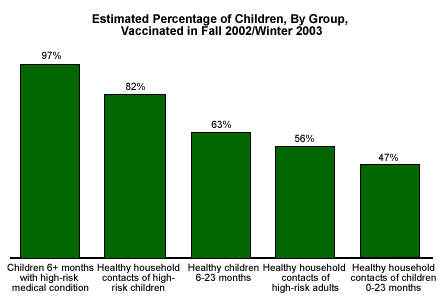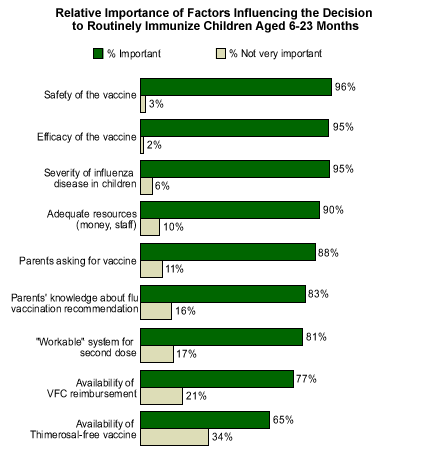On Oct. 15, the Advisory Committee on Immunization Practices (ACIP) -- a 15-expert panel selected by the Secretary of Health and Human Services -- voted to recommend that babies and toddlers between the ages of 6 months and 23 months be vaccinated annually against influenza. Previously, the ACIP had only encouraged vaccination for this age group, when vaccination was considered feasible. One of the reasons that the ACIP voted to make the practice a full-blown recommendation was that influenza-related hospitalization rates for young children are similar to those for adults aged 50 to 64.
What does the change imply? The ACIP's recommendation has been forwarded to the Centers for Disease Control and Prevention (CDC) and the Department of Health and Human Services for consideration. If the CDC adopts it as an official recommendation, it will be widely published and distributed to medical professionals.
To help the CDC better understand how well, and to what extent, the nation's pediatricians would follow the recommendation, the CDC's National Immunization Program and the Office of Health Communications worked with Gallup to conduct a survey of the nation's pediatricians. The resulting study of 251 pediatricians was conducted in September*. It found that less than half (47%) of pediatricians are either "very satisfied" or "extremely satisfied" with their practices' ability to meet community needs for pediatric vaccination; 15% said they are dissatisfied.

Pediatric Influenza Vaccination Intentions
Despite their hesitancy to express high levels of satisfaction with their ability to meet the community needs for pediatric vaccination, almost all pediatricians reported that during the fall 2002/winter 2003 flu season, they routinely offered vaccinations to both children with high-risk medical conditions and those who live in the same households with such children. Only about two-thirds reported routinely offering vaccinations to healthy 6- to 23-month-olds.

For this flu season, about two-thirds of pediatricians expect to routinely offer flu vaccine to all children aged 6 months and older. Less than one-third are planning to vaccinate only those children with high-risk medical conditions.

Pediatricians said that their decisions to provide routine flu vaccinations to children are most influenced by perceptions and beliefs regarding: 1) the safety of the vaccine; 2) the efficacy of the vaccine; and 3) the severity of influenza in children. Adequate resources as well as parent requests for vaccinations are also important factors.

Bottom Line
Generally, this study indicates that a new CDC recommendation regarding flu vaccines for young children would not require a behavior change for the majority of the nation's pediatricians -- most had planned to do so anyway. But that's not to say full implementation of the recommendation for all pediatricians and their patients won't require significant education, for both providers and parents. The benefits to young children, who are at high risk for the flu, should make these efforts worthwhile.
*Results based on a national telephone survey of 251 pediatricians, conducted Sept. 4-22, 2003. For results based on this sample, one can say with 95% confidence that the maximum error attributable to sampling and other random effects is ±6.3 percentage points.